German TV Drama Biz Deals With The Aftershocks Of U.S. Players Exiting Scripted In One Of Europe’s Key Markets
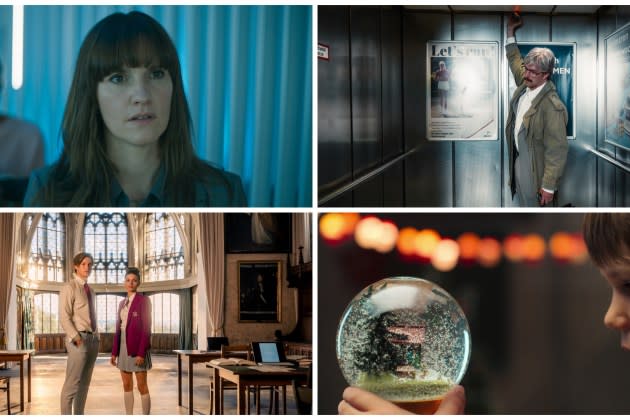
When Comcast-owned Sky Deutschland cancelled its usual drama event at the Munich Film Festival at short notice last summer, it came as a surprise. That surprise quickly turned to shock and bitter disappointment when the pay-TV giant revealed it wasn’t simply nixing a networking bash, it was exiting the original drama business full stop.
More bad news followed as the local impact of Paramount Global reining in spend on original international drama kicked in – German shows were yanked off the streamer and projects in the works canned. This wasn’t that long after HBO Max had pulled out and Starz Play closing simply added to a stream of bad news. Apple, Disney+ and Prime Video remain in the German drama business, but commission in such low volume that it is the thinnest of silver linings for the vast majority of local scripted prodcos. The strategy at Netflix, easily the most active of the streamers, is a talking point right now, as well.
More from Deadline
That’s why as we head into the next edition of the Munich Film Festival, many see Germany’s TV drama market nearing an inflection point, and believe coming months will shape things for many years to come. Despite remaining the giant of European mainland broadcasting, there are widespread fears from production sources that hundreds of projects in development will never see the light of day or will create a log-jam that stifles new projects. It was the talk of the industry at the Seriencamp festival and conference earlier this month.
Indeed, the global streaming market correction is being felt and there is little real insight into what rate the international streamers will commission at, especially with slow-moving media law reform potentially commanding them and local services such as Joyn and ARD Mediathek to invest a proportion of their local revenues in production. Pressure is heaped on ZDF, RTL and ProSiebenSat.1, despite budgets continuing to fall at the traditional broadcasters and the TV ad market forcing the commercial players into layoffs and strategy switches last year.
Conversely, German drama is in vogue – Netflix’s data dump revealed missing child drama Liebes Kind (Dear Child) has been one of its most-watched shows. Soapy romantic drama Maxton Hall – The World Between Us is Prime Video’s biggest ever international launch, with a second season about to start filming. The likes of Deutschland 83, Das Boot, Dark and Babylon Berlin underscore the German TV drama’s international bona fides.
The Seriencamp festival and conference in Cologne was a moment to take stock. On the record, there was an effort to remain positive. But away from the conference stage, numerous local drama producers are worried. The number of projects that had been in development or about to enter production and that are back on the market after the Sky and Paramount retrenchment is stifling room for new ideas to break through.
One senior exec told Deadline it will take at least all of 2025 for these to find new homes — or not. They estimated as many as 100 projects, from very early development to pre-production to finished and canned are on the market.
Lauded screenwriter Annette Hess was at Seriencamp to collect Deadline’s first-ever German TV Disruptor Award. Characteristically, she pulled no punches and when asked about the state of the local market, noting that while she has several projects in the works, but her younger colleagues are panicking given the lack of opportunities. Considering the reliance on IP, her advice to newer talent is “write a novel first and then the series,” – a trick she pulled off with her Disney+ series The Interpreter of Silence, which was based on her book Deutsches Haus.
Speaking about the current market correction, she added: “There were so many productions in the gold-digger atmosphere, and I was asking myself years ago, ‘Will this produce too much?’ It was a bubble – and now it’s over. On the other hand, we are coming into a [time of] much more quality, because it’s not the mass-market.”
On that note, we hear the quality of the Sky projects that flooded the market hasn’t impressed every senior network commissioner who has assessed them — though KRANK Berlin, a hospital drama from former physician turned screenwriter Samuel Jefferson and Viktor Jakovleski was picked up by ZDFneo. The show, from Violet Pictures and Real Film Berlin, is about a young doctor, played by Dear Child‘s Haley Louise Parker, who manages a chaotic emergency room in Germany’s capital. Today, Apple boarded the series, as we revealed a few minutes ago.
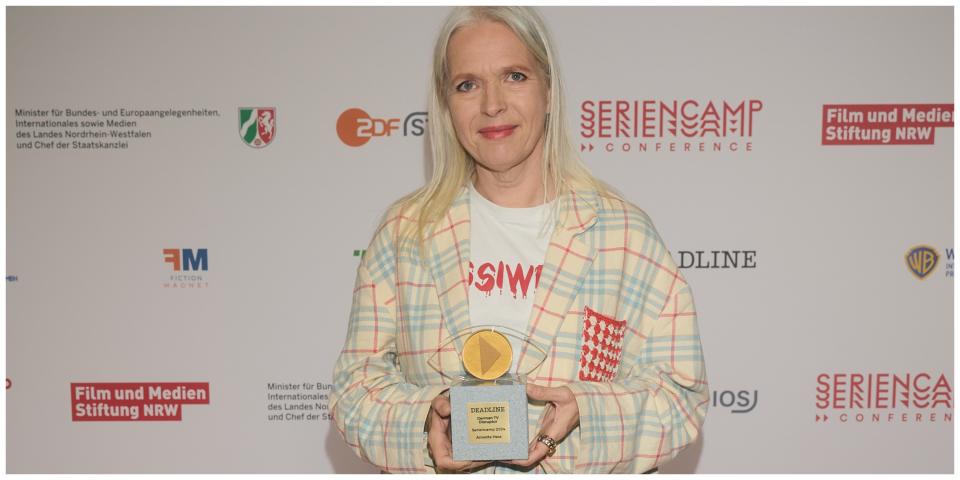
Former Warner Bros. exec Sabine de Mardt runs the German arm of French giant Gaumont, which made The Interpreter of Silence, and is also part of the local producers’ association. She is positive about the fundamentals of the German market, but wants to see the slow-burning changes to the country’s media laws introduced to boost competitiveness.
“Of course, things changed after the fight for pole position among the streamers ended after their start-up phases, and interest rates make things expensive… but we still have a healthy market,” she said. “We will need to be more creative in terms of co-production and financing.”
Another producer, who leads the German arm of a European production outfit, said that program makers needed to see current conditions as “a challenge and chance for something new,” but acknowledged, “the insecurity is quite big on all sides — producers, streamers and broadcasters.”
De Mardt and the German producers’ group Produktions Allianz are lobbying for changes to boost a sector buffeted by a perfect storm. German authorities have given cause for hope, with a proposed levy on streamers, a new 30% tax break and moves to make it easier for producers to retain rights. But while market developments have come fast, progress has been slow. There remain questions on how a tax break would be implemented and, as we’ve seen in countries such as Canada and Australia, commissions can dry up while the law is drawn up and passes slowly through government. Furthermore, projects in development can slow as streamers want their new commitments to qualify against the new rules.
Local to global-sized problems
Sky’s decision to retrench was widely thought to have come from the U.S., with the company’s well-regarded local drama execs left blindsided, local producers said. The pay-TV company did commit to finishing all shows in physical production, while those in development were paused. We understand insiders at Sky feel they have supported producers to find new homes for the programs or retake the rights at a fair price.
At a local level, Sky is facing extra competition for sports rights with Amazon and DAZN now bidding, and in the sports-versus-local drama battle. In terms of programming priorities, it looks like sports won, alongside a renewed focus on U.S. acquisitions such as House of the Dragon and Barbie, access to partner apps such as Paramount+ and Netflix and the rollout of the dishless Sky Stream product. There is no hint the original content decision will be reversed, but several non-scripted shows remain in production, such as Diese Ochsenknechts, and others such as documentaries Gefährlich nah and Der Parkhausmord have launched recently. The remaining partners behind Babylon Berlin, which is arguably Sky Deutschland’s most well known original, this morning confirmed a fifth and final season of the crime drama later this year.
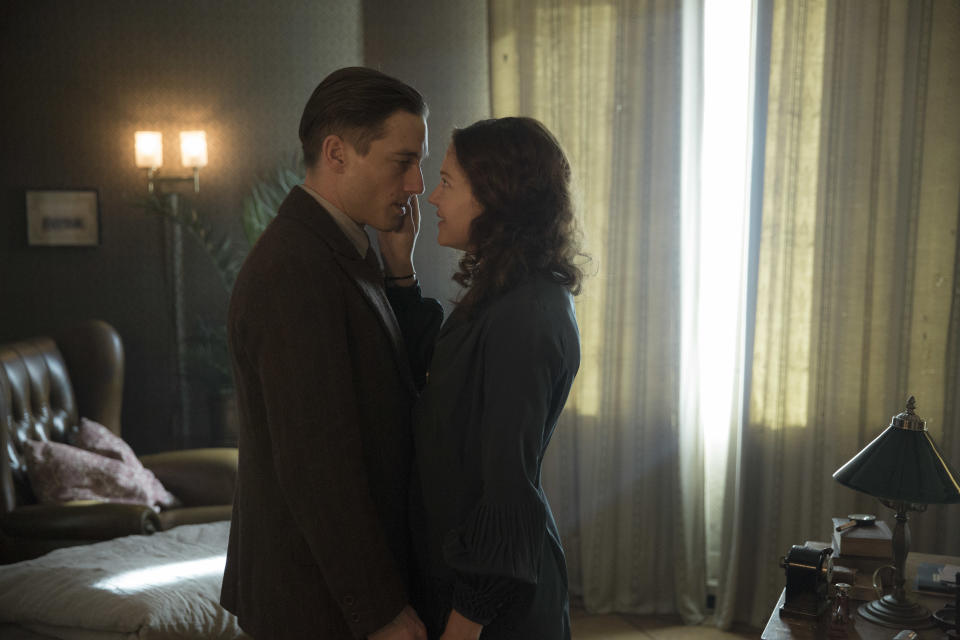
A Sky spokesperson pointed to an internal note from Devesh Raj from June last year. At the time, the current Group Chief Operating Officer at Sky in the UK was CEO of Sky in the DACH (Germany, Austria, Switzerland) region. He had written: “As Europe’s leading direct-to-consumer media and entertainment company, we know our customers well. Though we remain incredibly proud of our scripted Sky Originals to date, we are also confident that as the best provider of premium, acquired content, an unmissable range of sports and all the best entertainment apps, aggregated into one industry-leading platform – Sky Q – together with our streaming service Wow we are well positioned.”
Paramount’s withdrawal was signposted by former CEO Bob Bakish, who said its Hollywood fare was the global priority. That decision is driven by financial and creative decisions as the studio got its house in order ahead of a protracted sale — one that now appears unlikely to happen. Just like with Sky, it was a shock to the local community. “Paramount+ went from wanting CSI: Berlin to flatlined communications,” said a well-known drama producer.
A Paramount rep said American fare such as HALO, Mission: Impossible – Dead Reckoning and Star Trek Discovery ranked among the streamer’s most-watched titles locally. They added that there were still German-language originals in production at Paramount+ and the company’s local channels and noted shooting on drama series Anywhere, which is from Gaumont, will finish soon. Germany Shore, which is the most watched unscripted series on the service, is getting a new season. Originals such as Chemistry of Death, One Trillion Dollars and Zeit Verbrechen are now being shopped by Paramount Global Content Distribution, while Susanne Schildknecht, who oversaw German originals for Paramount+, remains SVP of MTV Entertainment Content & Brand, Europe & Middle East and Local Originals GSA for Paramount International.
Disney+ remains an active player, but is also commissioning in very small amounts. It has been making noise with its Gaumont-produced fashion drama Becoming Karl Lagerfeld, and announced Satel Films’ period comedy Vienna Game at Series Mania in France in March. Vienna Game is set around the Congress of Vienna, which set out a new European political order after Napoleon’s downfall, and is shooting in Eastern Europe ahead of a 2025 launch. At least one other German drama is understood to be close to production.
‘Back to a sustainable baseline’
The financial reality is biting for everyone, with money more expensive and drama harder to finance. “The German industry is suffering from the same problems the worldwide industry is suffering from,” said Robert Franke, VP of Drama at ZDF Studios. “There was a lot of cheap money available. It has been put into the content industry because of a fantasy that there was sustainable, infinite growth and people would spend 24 hours a day watching content. There was also a race to gain market shares for some of the multibillion dollar pan-global conglomerates and that fight is over now. It’s going back to more of a sustainable baseline.”
Danna Stern, the former head of Israel’s Yes Studios who now runs In Transit Productions out of Berlin, senses that with the volume of drama being produced falling after the peak of peak TV’s moment, non-English-language drama faces particular challenges.
“Anybody doing non-English language is feeling the strain more than ever,” she said at Seriencamp. “’Travelability’ was a word that Netflix invented at one point for the local shows that makes it globally. Now we’ve gone back to square one, people are producing primarily for their own market.”
The withdrawal of U.S. players and American money means the pubcasters are once again the major commissioners, but to produce drama on the same scale as the global players is challenging for local channels. The European Alliance, which formed in 2018 and comprises Germany’s ZDF, France Televisions and Italy’s RAI, sees them work together on big-ticket drama such as Around the World in 80 Days and The Swarm. Upcoming series include Kabul and The Emperor’s Stone. At Seriencamp, it shared a first look at footage of thriller The Kollective, about a group of European citizen journalists drawn into an international conspiracy and from Leonardo Fasoli and Maddalena Ravagli who were behind iconic Italian series Gomorrah.
Producers pitch into an annual call for projects that is themed – last year the theme was AI – to get the Alliance on board and results are unveiled at the MIA programming market in Rome in October, and a new round of pitches duly commences. It wants both family friendly fare and edgier drama about contemporary world, but can ultimately only finance as much as European broadcaster budgets allow. For ZDF, it is a lifeline that allows it to order shows at financial levels much closer to those of the streamers.
Prime Video’s local drama boss Petra Hengge told Seriencamp it is looking for a couple of series a year, not enough to sustain a suffering production market. “We’re not in the numbers game — we don’t do 15 shows a year — so we’re very carefully picking what we’re doing,” she added. Off the global success of Maxton Hall, Amazon is unsurprisingly looking for lighter mainstream fare. “We call it ‘popcorn entertainment’ that makes you feel better,” said Hengge. “You can just sit down with your loved one and have a good time watching it.”
One drama producer said Prime Video’s commissioning team have “found their road map” and are “really stable” right now. “They’ve identified the genres and formats that work for them,” they added. “Maxton Hall is an example of that — you might have an opinion on it creatively, but economically it works for the market.” Amazon has also rolled out buzzy shows such as 2023’s big-budget fantasy drama The Gryphon, based on Wolfgang Hohlbein and Heike Hohlbein’s 1989 novel Der Greif.
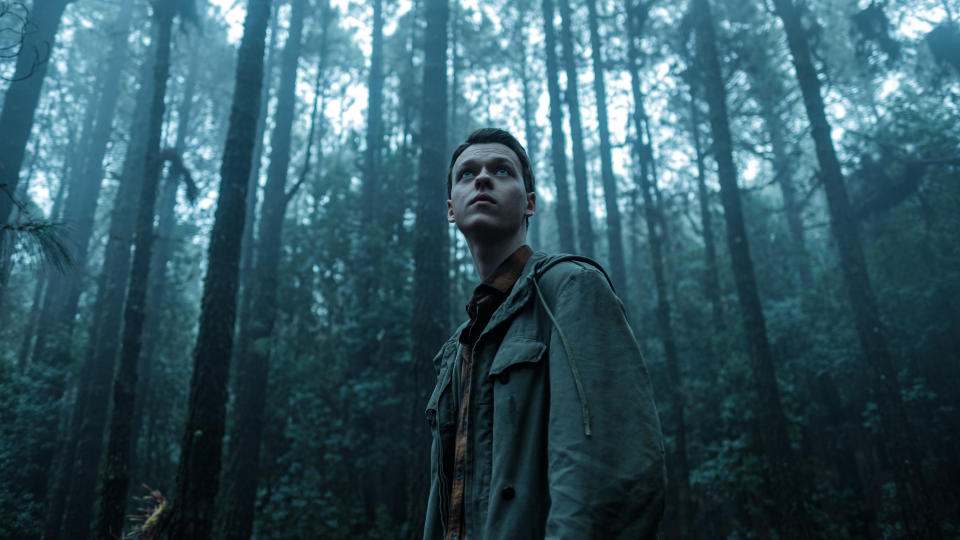
Apple, meanwhile, is in its infancy in German originals. Producers are excited for the new player but it is unlikely to be a high volume operator. While the streamer has been active on the development front, only one — UFA Fiction’s darkly comic Where’s Wanda? — has been commissioned. “The show has been in post for ages, and everyone is really hoping is does well when it launches,” a source at a rival production company added. Apple declined to comment for this article, but we hear there is positive energy around it at the streamer and understand it should launch later this year. Production sources suggest dozens of projects have been in development with Apple, though internally the figure is considered something closer to “a handful,” said one source.
Our production source said there was frustration that all German projects have to go through London-based Apple TV+ Europe boss Jay Hunt, who works with Apple’s U.S. content bosses to select which move forwards — though this model isn’t unusual for a global streamer. Producers want Apple and its local commissioner, Franziska an der Gassen, to be a key partner but, like other international services, it is not a volume player. However, it is certainly active: Just this morning, it joined ZDFneo on KRANK Berlin, as we revealed. In that vein, Apple insiders tell us the streamer will continue to invest in German programming, which should provide hope to local suppliers.
Apple’s biggest-budget show out of Germany to date, Constellation, was an international production and not even initially supposed to be made in the country. At a Seriencamp masterclass on the series, Daniel Hetzger of Turbine Studios Germany revealed how his team had to build a business case to explain why it should be made in the country as opposed to the UK, U.S. or cheaper Eastern European territories. Apple did not, in fact, commission the show, but licensed the international rights when Turbine and co-producer Haut et Court secured several tranches of European soft money to build a €100M ($110M) budget.
Netflix — which has had huge success in Germany through the likes of Constantin Television’s Dear Child, mystery series Dark and Oscar winner All Quiet on the Western Front — remains active on the commissioning front and in March unveiled a sizeable slate at its Next On showcase in Berlin. At that event, Katja Hofem, Netflix’s Vice President of Content For DACH, said: “We want to continue our successful path together with our partners – with the common goal of creating unique entertainment that moves and inspires people.”
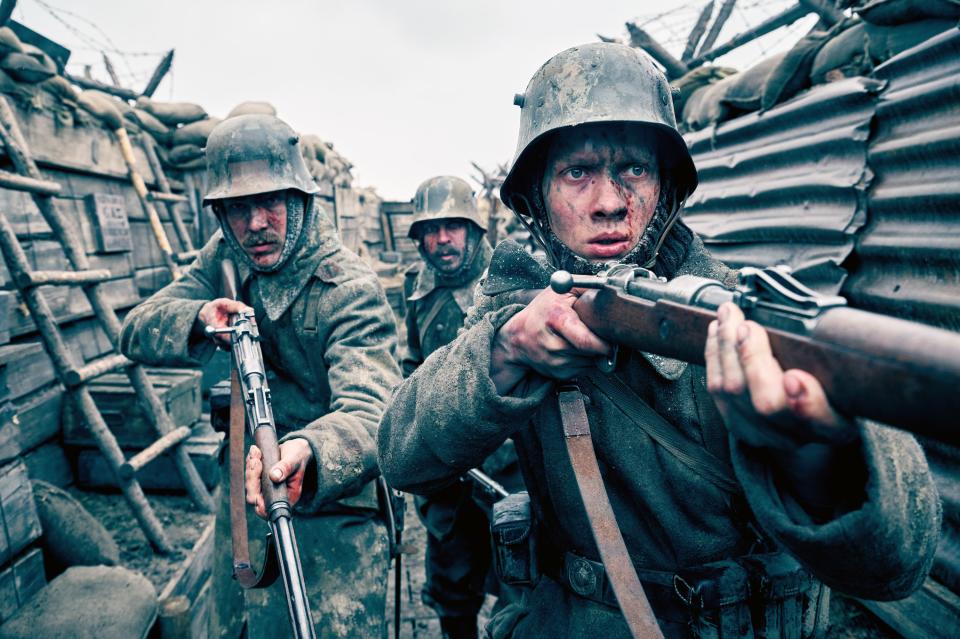
However, there is frustration from within the production community. We’ve heard stories of shows receiving greenlights only for execs to order script rewrites months later, deep into the development phase. Netflix insiders see their development and note giving process as a natural part of the creative process and not out of the ordinary. Whatever the case, it is fair to say Netflix is by far the most active of the international streamers.
There have also been question marks raised over the status of some high-profile series, such as Wiedemann & Berg TV and Doghaus Films urban thriller The Grimm Reality. Ordered at the back end of 2022, we understand filming did wrap, but it was not launched and one source with knowledge of the project said: “It’s ended up in a dark cellar.” As we revealed this morning, Netflix has quietly shelved the show. Insiders stress the streamer is working with Wiedemann & Berg on other titles such as recent series 60 Minutes and the upcoming films Brick and Blame the Game, while action-thriller series Crooks was given the greenlight for a second season just this past weekend after performing very well on Netflix’s non-English TV charts in several countries. Netflix declined to comment for this article.
The German broadcasters’ own streaming services are commissioning. RTL+ launched its new crime miniseries Ich Bin Dagobert (I Am Scrooge) at Seriencamp to a mixed reception. Pubcaster ZDF’s ZDF Neo and commercial giant ProSiebenSat.1’s Joyn are also ordering, albeit in measured amounts. “The public service broadcasters are stable because they have schedules to fill,” said a production source. “This is a machine that is working.”
Joyn shared footage of its new vampire comedy Der Upir at Seriencamp and another comedy, KEK*S, which had the audience in stitches at Seriencamp. Thomas Münzner, Head of Programming at Joyn, said the streamer is bucking the trend for limited series and films. He is looking at soaps in conjunction with Sat.1 and wants returners. “We don’t want one-off shows,” he added. “We always want to have a show with a first season and the ability to do more seasons. In Germany, we have so many streaming services you need to find things that are really appealing and stand out from all of the other shows.”
Joyn is looking at four to five original series for 2025 with a heavy skew to comedy and aims to bring one of its 2024 shows back. Münzner said the streamer is already looking at the 2026 slate and specifically for romantic, female-skewing serialized shows. Zooming out, there is an ongoing battle between ProSieben’s current management and some of its key shareholders, who disagree with the notion the company’s entertainment efforts should be built around Joyn. To date, that’s not noticeably impacted the streamer’s slate, but market sources are watching closely.
Other new projects on the radar include ZDF’s Pied Piper horror series Hameln, which sees the children taken by the piper return to the modern-day village from which they were abducted. ZDF is also circling Crimson Crown, the horror thriller from Dario Argento. Netflix’s regional series boss, Jan Bennemann, has been talking up Mindful Murders, the streamer’s upcoming dark comedy starring Tom Schilling from Constantin Film.
This is reason for cautious optimism, but the overriding sentiment from the market right now is apprehension. It’s now nearly a year since Sky’s demise, and with this year’s Munich Film Festival beginning on Friday (June 28), producers will be hoping for no further shock events.
Best of Deadline
Hollywood & Media Deaths In 2024: Photo Gallery & Obituaries
2024 Premiere Dates For New & Returning Series On Broadcast, Cable & Streaming
Sign up for Deadline's Newsletter. For the latest news, follow us on Facebook, Twitter, and Instagram.

 Yahoo News
Yahoo News 
